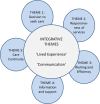Perceptions of emergency care using a seizure care pathway for patients presenting to emergency departments in the North West of England following a seizure: a qualitative study
- PMID: 30269063
- PMCID: PMC6169770
- DOI: 10.1136/bmjopen-2017-021246
Perceptions of emergency care using a seizure care pathway for patients presenting to emergency departments in the North West of England following a seizure: a qualitative study
Abstract
Objectives: To establish the appropriateness of a previously developed seizure care pathway by exploring to what extent patients valued the intervention and perceived it as being helpful or not.
Design: Qualitative descriptive study, using semistructured, in-depth interviews and thematic template analysis, theoretically informed by critical realism.
Setting: In North West England, a seizure care pathway has been developed in collaboration with a specialist neurology hospital to support clinical management of seizure patients on initial presentation to the emergency department (ED), as well as access to follow-up services on discharge, with the aim of improving patient experience. Three National Health Service (NHS) EDs and a specialist neurology hospital provided the setting for participant recruitment to this study.
Participants: 181 patients fulfilled the inclusion criterion with 27 participants taking part following their experience of an ED attendance and outpatient follow-up appointment after a seizure.
Results: Five main themes emerged from the data: decision to seek care, responsiveness of services, waiting and efficiency, information and support, and care continuity. Two integrative themes spanned the whole study: lived experience and communication. This paper reports on two of the main themes: care continuity, and waiting and efficiency. The average time between ED presentation and interview completion was 100 days.
Conclusions: Implementation of a care pathway is a complex intervention, requiring long-term follow-up to assess its integration into practice and effectiveness in service improvement. The seizure care pathway has the potential to enhance the care of seizure patients in the ED and at follow-up by improving continuity and management of care. The study demonstrates good aspects of the seizure care pathway as observed by patients and also recognises shortcomings within current service provision and questions what the NHS should and should not be delivering. Our study suggests various ways to enhance the pathway at service level to potentially drive improved patient experience.
Keywords: epilepsy; organisation of health services; qualitative research; quality in health care.
© Author(s) (or their employer(s)) 2018. Re-use permitted under CC BY. Published by BMJ.
Conflict of interest statement
Competing interests: None declared.
Figures
References
-
- House of Commons Committee of Public Accounts. Financial sustainability of the NHS: Forty-third Report of Session 2016-17, 2017.
-
- England NHS. NHS Five Year Forward View. London: NHS England, 2014.
-
- Hiller M. Great Britain: Parliament: House of Commons: Committee of Public Accounts. HC 502 - Services to People with Neurological Conditions: Progress Review: Stationery Office, 2016.
Publication types
MeSH terms
LinkOut - more resources
Full Text Sources
Medical

